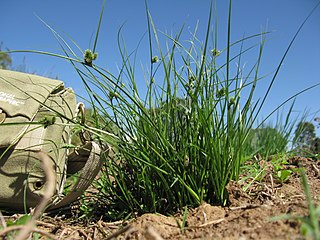
Carex inversa, commonly known as knob sedge, is a species of sedge of the family Cyperaceae that is native to parts of Australia and New Zealand and has also been introduced into Great Britain.
Cyperus digitatus, also known as finger flatsedge in the United States, and chang xiao sui suo cao in China, is a sedge of the family Cyperaceae that is native to tropical and subtropical areas of Africa, Asia, the Americas and Australia.
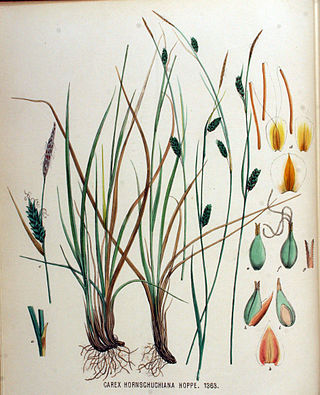
Carex hostiana, the tawny sedge, is a species of flowering plant in the genus Carex, native to Europe and northeast Canada, and extinct in Massachusetts. It is a member of the Carex flava species complex.
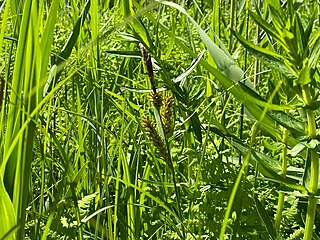
Carex rugulosa, also known as the thick-nerve sedge or the slender-culm thick-nerve sedge, is a tussock-forming perennial in the family Cyperaceae. It is native to eastern parts of Asia.
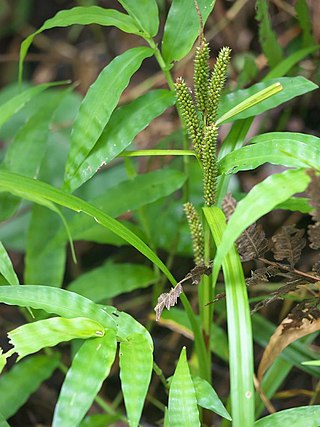
Carex alliiformis is a tussock-forming perennial sedge in the family Cyperaceae. It is native to eastern parts of Asia.

Carex breviscapa is a tussock-forming perennial in the family Cyperaceae. It is native to eastern parts of the south east Asia and north eastern Australia

Carex scaposa, also known as hua ting tai cao in Chinese, is a tussock-forming species of perennial sedge in the family Cyperaceae. It is native to eastern parts of Asia.
Carex caespititia, also known as cong sheng tai cao, is a tussock-forming species of perennial sedge in the family Cyperaceae. It is native to parts of Asia from Assam in northern India in the west to central China in the east.

Carex cruenta is a tussock-forming species of perennial sedge in the family Cyperaceae. It is native to parts of Asia, from Pakistan in the west to south central parts of China in the east.

Carex parva, also known to Chinese people as xiao tai cao, is a tussock-forming species of perennial sedge in the family Cyperaceae. It is native to parts of Asia from Afghanistan to Mongolia.

Carex gaudichaudiana, also known as fen sedge, is a tussock-forming species of perennial sedge in the family Cyperaceae. It is native to parts of Australia and New Zealand.
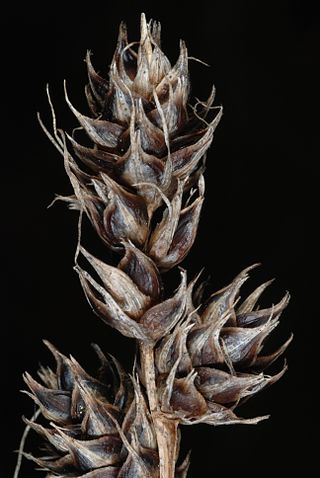
Carex gravida, also known as heavy-fruited sedge, heavy sedge or long-awned bracted sedge, is a tussock-forming species of perennial sedge in the family Cyperaceae. It is native to southern parts of Canada and parts of the United States.
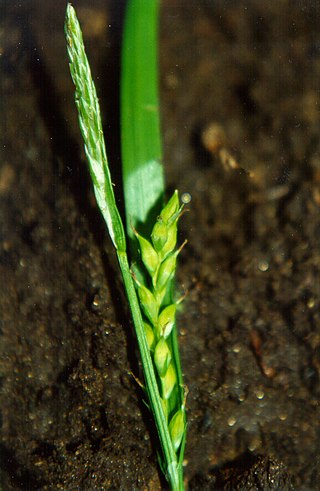
Carex hendersonii, also known as Henderson's sedge or carex de Henderson, is a tussock-forming species of perennial sedge in the family Cyperaceae. It is native to western parts of North America.
Carex helferi is a tussock-forming species of perennial sedge in the family Cyperaceae. It is native to parts of South East Asia.
Carex interrupta is a tussock-forming species of perennial sedge in the family Cyperaceae. It is native to south eastern parts of Canada and north eastern parts of the United States.
Carex krausei, commonly known as Krause's sedge or carex de Krause in Canada, is a tussock-forming species of perennial sedge in the family Cyperaceae. It is native to subarctic areas of Greenland, Alaska, northern Canada and Russia.
Carex cephalotes, also known as wire-head sedge, is a tussock-forming species of perennial sedge in the family Cyperaceae. It is native to south eastern Australia and New Zealand.

Carex digitalis is a tussock-forming species of perennial sedge in the family Cyperaceae. It is native to south eastern parts of Canada as well as central and eastern parts of the United States.

Carex vestita, also commonly known as velvet sedge, is a tussock-forming species of perennial sedge in the family Cyperaceae. It is native to eastern parts of the United States.

Carex dickinsii, also known as Dickins' sedge or chao xian tai cao in pinyin, is a tussock-forming species of perennial sedge in the family Cyperaceae. It is native to parts of Japan, Taiwan and south-eastern China.














